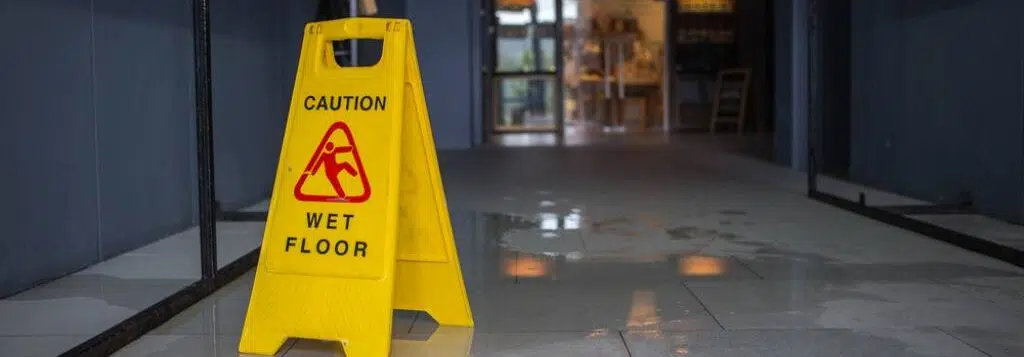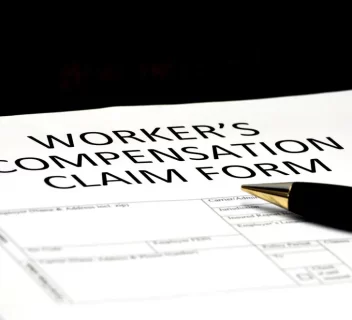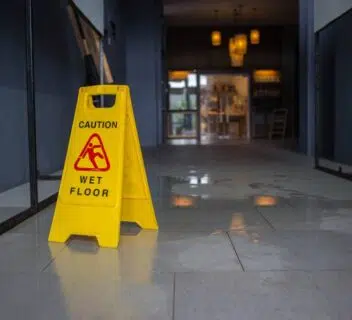What You Need to Know About a Slip and Fall at Work
If you’ve slipped and fallen at work, knowing your next steps is crucial after a slip and fall at work. This article will guide you on immediate actions, documentation, and rights to compensation.
Key Takeaways
- Slip and fall accidents at work are significant safety concerns, often leading to severe injuries and financial repercussions for both employees and employers.
- Immediate actions after a slip and fall, such as seeking medical attention, documenting the scene, and reporting the incident, are crucial for successfully filing a claim and protecting rights.
- Employers can prevent slip and fall incidents by implementing safety protocols, conducting regular inspections, and providing employee training programs to foster a safety-conscious workplace culture.
Understanding Slip and Fall Accidents at Work
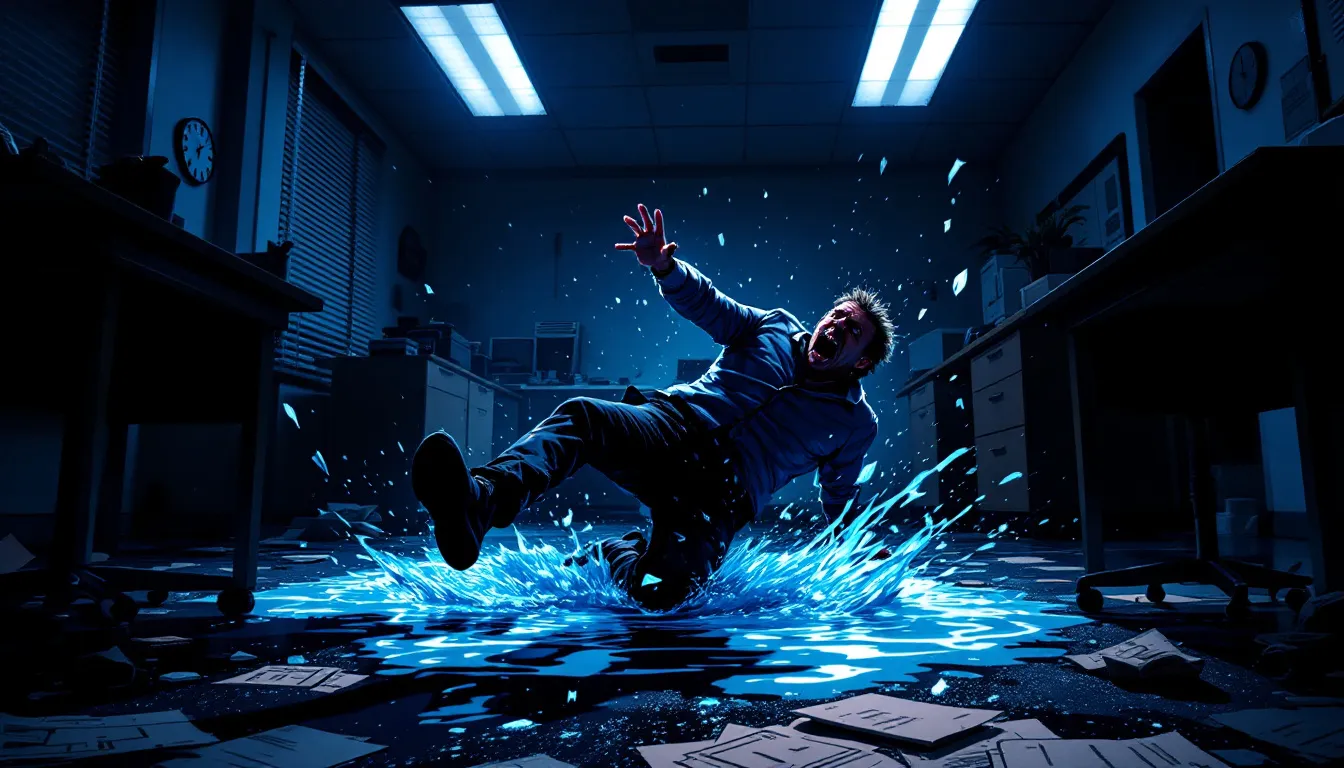
An individual may experience a slip and fall accident when they lose their footing and tumble due to unsafe conditions on another person’s property.
In work environments, such incidents often result in serious injuries that include:
- broken wrists
- broken arms
- broken hips
- more extreme outcomes like lasting disabilities
The repercussions of sustaining a slip and fall injury can be extensive, leading to substantial medical expenses and difficulties impacting one’s professional and personal life.
Recognizing the characteristics of these accidents is crucial for both prevention and intervention strategies.
Slip and fall incidents should not be regarded as rare events. Rather, they pose a serious risk within workplace safety protocols. Hazards like wet or slippery surfaces are common culprits behind such misfortunes, thereby highlighting the importance of employers ensuring their premises remain hazard-free.
By becoming familiar with frequent causes and related data concerning these mishaps, both workers and business owners can actively engage in measures aimed at diminishing their frequency.
Common Causes of Workplace Slip and Falls
Accidents involving slips and falls in the workplace can arise from numerous overlooked hazards. Common factors contributing to these incidents include wet floors, irregular surfaces, and inadequate lighting that unexpectedly precipitate a person’s slip, potentially leading to harm. Work areas cluttered with debris or loose cables also pose risks for trips and falls, highlighting the importance of maintaining cleanliness and organization. Highlighting the importance of maintaining cleanliness and organization, it is crucial to address property owner’s negligence to prevent such accidents.
Staircases are particularly prone to being sites of slip-related accidents. Stairs in disrepair with issues such as wobbly steps or damaged handrails may lead to grave injuries if not remedied promptly. It is vital for employers to perform regular safety checks aimed at identifying and correcting these dangers. The use of clear signage warning against wet floors and other potential threats plays an essential role in accident prevention.
By taking preventative actions, employers have the power to lessen many risks associated with slips and falls on their premises. Steps such as immediate spill cleanup, ensuring obstruction-free pathways, and performing consistent safety evaluations are fundamental procedures that should be adhered to rigorously. Crafting an all-encompassing plan specifically designed to prevent slips and falls will markedly diminish the likelihood of workplace mishaps while bolstering overall employee well-being.
Statistics on Workplace Slip and Fall Injuries
The number of fatalities resulting from workplace slip and trip incidents in the United States is strikingly high, with over 17,000 deaths each year attributed to such accidents. The Bureau of Labor Statistics notes that slips, trips, and falls contribute to a significant portion—between 15% and 25%—of all nonfatal injuries on the job, making them some of the most common mishaps employees encounter.
In terms of specific data from 2020, slips, trips, and falls were responsible for approximately 18% of the total reported nonfatal occupational injuries amounting to 1.176 million cases that led to workers taking time off work. These figures serve as a stark reminder of how essential it is for businesses to implement robust safety protocols and educational initiatives aimed at minimizing slip-and-fall-related hazards within workplaces. Recognizing these facts underscores just how vital it is for organizations to take proactive steps toward reducing fall injury risks among their staff.
Steps to Take Immediately After a Slip and Fall Accident
In the event of a slip and fall incident, the actions you take immediately afterward can greatly influence your ability to pursue compensation and safeguard your legal rights. It is essential first to obtain medical attention in order to properly identify any injuries sustained and ensure they are recorded medically. This step not only prioritizes your well-being but also produces important documentation for your fall claim, especially in cases of traumatic brain injury.
It’s equally important to meticulously record details at the scene of the accident. By gathering tangible evidence like photographs, video footage, and accounts from witnesses, you create a solid foundation that can demonstrate what happened during the slip and fall as well as potentially prove negligence on another party’s part.
Lastly, it is imperative that you report this occurrence promptly to your employer. Doing so establishes an official log of events and begins the process for workers’ compensation claims if applicable. Keep in mind that there are deadlines associated with filing a claim after experiencing a slip-and-fall accident. Acting swiftly ensures compliance with these time constraints.
Seek Medical Attention
Immediately after experiencing a slip and fall accident, it is imperative to seek medical attention. Prompt treatment not only helps in managing your injuries but also serves to officially record them. Make sure you let the doctor know that the injury occurred as a result of an incident at work so that this information is accurately captured in your medical records—a crucial detail when submitting a compensation claim.
Typically, within the framework of workers’ compensation, employers have the prerogative to select which physician will attend to your injuries unless it’s an urgent situation. Regardless of whether you perceive your injuries as mild or significant, obtaining immediate medical attention remains essential for both facilitating healing and bolstering any future claims for workers’ compensation benefits.
Document the Accident Scene
To construct a compelling case, it’s imperative to meticulously document the site of the accident. Accumulate substantiating materials like photographs and videos that depict unsafe conditions in order to establish proof of negligence. Compile statements from observers who witnessed the event. These will reinforce your narrative and confirm whether property owners were cognizant of the danger.
Acquiring incident reports prepared by managers or proprietors can yield pertinent insights, encompassing specifics regarding the mishap, testimony from witnesses, and initial responsive measures implemented. Maintenance records that demonstrate the regularity of checks performed and attention to known dangers can bolster your assertion further.
Report the Incident to Your Employer
It is imperative to inform your employer about the slip and fall incident as soon as possible in order to establish an official record. This action is vital for your workers’ compensation claim, and neglecting to report the event promptly could risk compromising your qualifications.
To guarantee an appropriate reaction and safeguard your rights, it’s important that you notify your employer without delay.
Proving Employer Negligence in Slip and Fall Cases
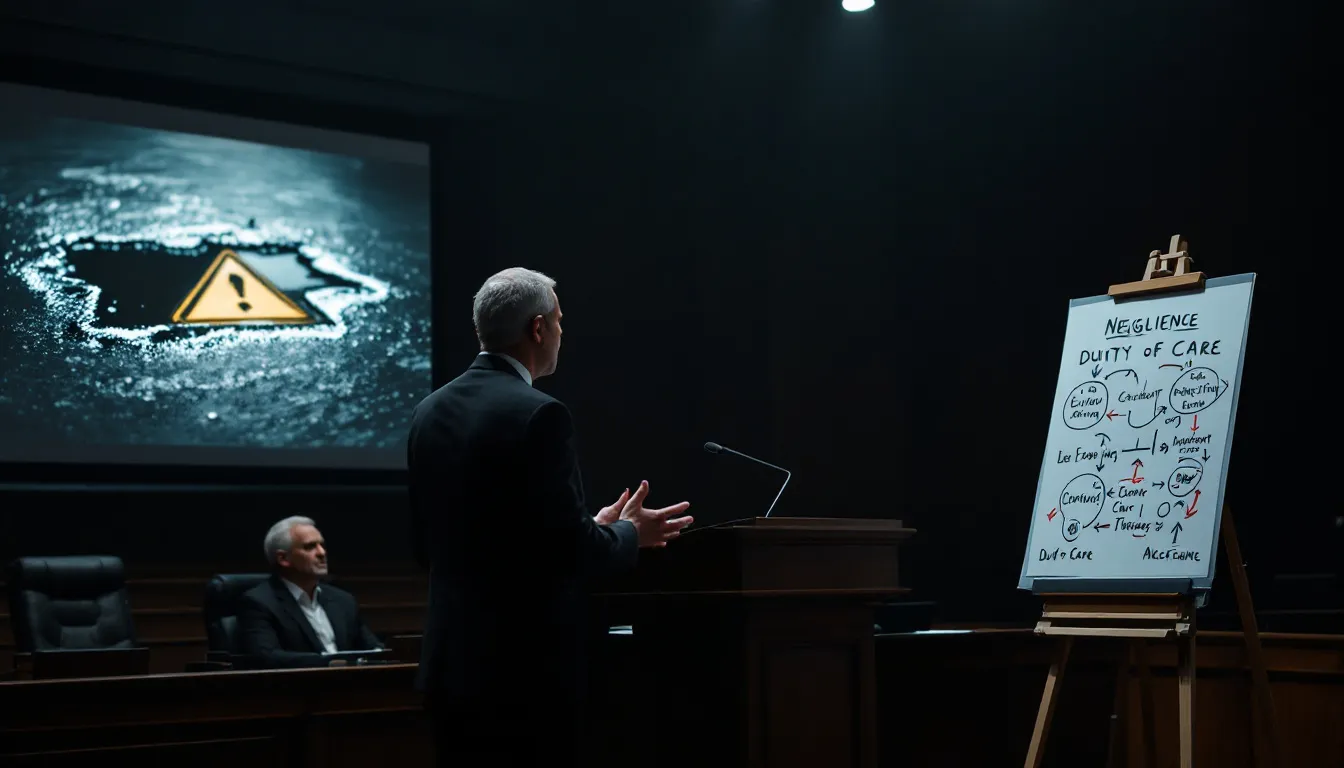
Demonstrating an employer’s failure to fulfill their responsibility is key in a slip and fall case in situations where workers’ compensation benefits may not be available, especially when severe outcomes like spinal cord injuries are involved. It’s essential to establish that the employer was responsible for maintaining safety, failed to do so, and as a result of this failure, you were injured. To effectively navigate through these requirements, detailed record-keeping is vital along with the counsel of an experienced personal injury attorney.
Taking swift measures following your slip and fall incident is imperative. Neglecting to initiate legal action before the expiration of the statute of limitations can lead to your claim being barred. With the assistance of an experienced attorney well-versed in such cases, you’ll be able to compile all necessary proof while they work towards securing a just compensation for your damages.
Gathering Evidence
Gathering evidence is key to proving negligence. Crucial evidence includes photographs, witness statements, incident reports, and medical records. Documenting the scene and securing witness accounts establish the circumstances that led to the fall. Medical documentation is particularly important, as it serves as key evidence supporting your injury claims.
If you couldn’t document the scene immediately, have someone else take pictures. Efficiently gathering and preserving evidence is vital to proving negligence.
Establishing Liability
Establishing liability involves proving the property owner had a duty to maintain a safe environment, breached it, and this breach caused your injuries. This often requires showing the hazardous condition existed for a significant period, implying the property owner’s negligence.
In premises liability claims, you must prove duty of care, breach, causation, and damages. Long-standing hazardous conditions can establish liability even if the owner claims unawareness. Employers may be held liable if they knew or should have known about the hazard.
Filing a Workers’ Compensation Claim
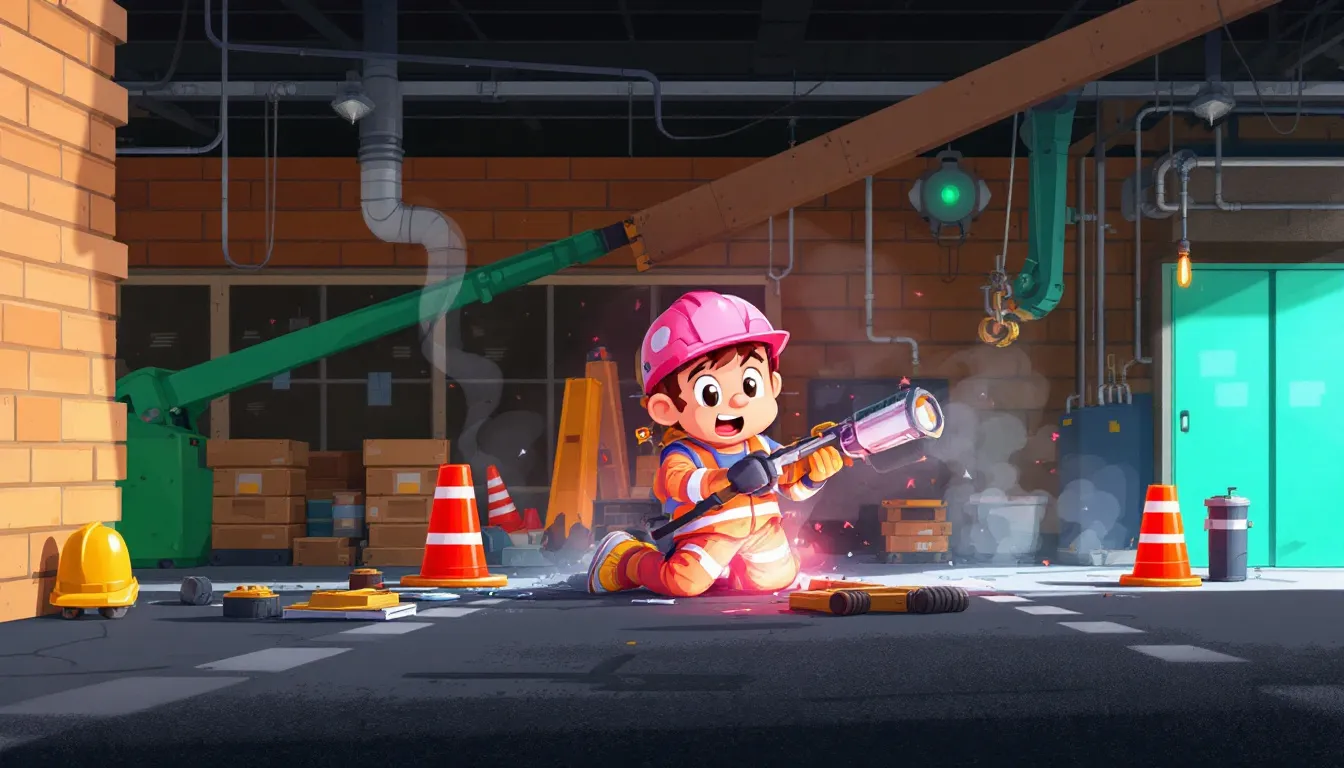
After experiencing a slip and fall at the workplace, it is essential to file a workers’ compensation claim. This type of insurance offers various benefits such as coverage for medical treatment, rehabilitation services, and partial restitution for lost wages. Typically, employees can apply for these benefits regardless of who was at fault in the incident, allowing them to recover compensation without resorting to legal action against their employer.
The complexity involved in these claims may differ. Some are relatively simple while others might necessitate going through an appeals process. Being well-versed in the eligibility requirements and following the correct procedures when submitting your claim is vital to ensure you secure the benefits you are entitled to.
Eligibility for Workers’ Compensation
To qualify for workers’ compensation, it is crucial to report the injury promptly. The permissible period for reporting a workplace injury can be quite brief, varying from three to four days depending on the state’s regulations. Specifically, in New Jersey, you are required to report a slip and fall injury within 14 days if you want to maintain eligibility for workers’ compensation benefits.
These benefits provided by workers’ compensation include coverage of medical expenses and partial compensation for lost wages. They do not account for the pain and suffering endured by the victim. Consequently, individuals may encounter economic difficulties due to continued medical expenditures and potential income loss resulting from their fall injury.
The Claims Process
Initiating a workers’ compensation claim begins with informing your employer about the incident. You’re required to complete certain documents, and then your employer is obligated to forward the claim within a 10-day period. The deadlines for submitting these claims are not uniform across all states. Take California as an example, where you possess up to one year to lodge your claim.
Depending on the unique details of your situation, navigating through this process may range from being fairly direct to rather complex. Some slip and fall incidents might reach resolution within merely months. Others could extend over a more protracted duration. Grasping each step involved and collaborating with an experienced attorney has the potential not only to expedite proceedings but also enhance prospects for achieving a favorable outcome.
Dealing with Claim Denials
Claim denials can be frustrating, but they are not the end of the road. If your workers’ compensation claim is denied, you can appeal. Note that compensation may be reduced if you are found partially at fault for the accident.
Consulting an experienced attorney can help you navigate the appeals process and seek fair compensation.
Additional Legal Options Beyond Workers’ Compensation
Should the benefits of workers’ compensation prove inadequate or your claim be rejected, you have other legal avenues to consider. Occasionally, if a third party’s carelessness contributed to your accident, it could form the basis for securing damages. A slip and fall lawyer can guide you in investigating these alternatives and striving for the fullest possible recompense.
In situations where an injury is inflicted through deliberate or rash behavior by someone else, employees might choose to initiate legal proceedings against this third party. Being aware of both your entitlements and obligations is vital when deciding whether to embark on extra-judicial measures.
Third-Party Liability Claims
If your injury was the result of a third party’s negligence, you could be entitled to extra compensation through third-party liability claims. This is possible even after accepting workers’ compensation benefits for the incident that occurred due to unsafe conditions caused by someone else. To make sure you are justly compensated, it’s crucial to seek advice from an experienced personal injury attorney.
Should an employee suffer injuries because of deliberate or careless acts committed by another, they have the right to initiate legal action against this external party. Aiming for a third-party liability claim might help in obtaining recompense for medical bills, lost income, and various other losses that aren’t typically covered under workers’ compensation provisions.
Personal Injury Lawsuits
In cases where personal injury lawsuits extend beyond the scope of workers’ compensation, engaging an experienced personal injury attorney is beneficial. Such a lawyer plays a crucial role in collecting evidence, negotiating with insurance entities, and formulating a robust legal claim. The potential damages addressed through this process include medical expenses incurred from injuries, loss of income due to inability to work, enduring pain and suffering as well as reduced life quality.
The amount compensated typically hinges on factors like the gravity of injuries sustained, overall medical costs involved and the degree of fault established. Some disputes may reach settlements out of court. Others might necessitate going through trial proceedings to secure just recompense.
Enlisting services from a comprehensive full-service law firm offers vital assistance during every stage of these complex legal endeavors.
The Role of OSHA in Work Safety
The Occupational Safety and Health Administration (OSHA) plays a crucial role in ensuring work safety by setting and enforcing standards, providing training and outreach, and conducting inspections to prevent workplace injuries and illnesses.
Understanding OSHA Standards
OSHA standards are designed to protect workers from hazards in the workplace. These standards cover a wide range of topics, including fall protection, electrical safety, and hazardous materials handling. Employers are required to comply with OSHA standards and regulations to ensure a safe working environment for their employees.
Employer Responsibilities Under OSHA
Employers have a responsibility to provide a safe working environment for their employees. This includes identifying and controlling hazards, providing training and personal protective equipment, and ensuring that employees follow safety procedures. Employers must also report workplace injuries and illnesses to OSHA and maintain accurate records of workplace incidents.
Seeking Legal Help from an Experienced Personal Injury Attorney
If you have been injured in a slip and fall accident, it is essential to seek legal help from an experienced personal injury attorney. An attorney can help you navigate the complex process of filing a slip and fall claim and ensure that you receive the compensation you deserve.
When to Consult an Attorney
You should consult an attorney as soon as possible after a slip and fall at work accident. An attorney can help you understand your rights and options, gather evidence, and negotiate with insurance companies. It is essential to act quickly, as there may be time limits for filing a claim. Additionally, an attorney can help you determine whether you have a valid slip and fall claim and what damages you may be entitled to.
Some key points to consider when seeking legal help from an experienced personal injury attorney include:
- Experience: Look for an attorney with experience handling slip and fall cases.
- Knowledge: Ensure that the attorney has knowledge of OSHA standards and regulations.
- Communication: Choose an attorney who is responsive and communicative.
- Reputation: Research the attorney’s reputation and read reviews from previous clients.
By seeking legal help from an experienced personal injury attorney, you can ensure that your rights are protected and that you receive the compensation you deserve for your slip and fall injuries.
If you’ve suffered a slip and fall at work, contact 1-800-THE-LAW2 today for a free consultation with a personal injury attorney in our professional network.
Long-Term Impact of Slip and Fall Injuries
Injuries from slip and fall accidents can cause significant, long-lasting repercussions that influence the well-being of victims on multiple levels. Due to their enduring impact, grave injuries such as traumatic brain damage, fractures, and persistent pain frequently result in greater compensation settlements. Permanent disabilities may stem from these afflictions necessitating continuous medical care and rehabilitative services, including those resulting from traumatic brain injuries.
Back injuries incurred during slip and falls—such as herniated discs—often entail sustained discomfort and difficulties with movement. Injuries to the head might lead to cognitive deficits that disrupt everyday activities. Recognizing the extended effects of these health issues is vital for calculating comprehensive damages and seeking adequate legal redress.
Chronic Pain and Disability
Severe slip and fall injuries frequently result in long-lasting conditions such as chronic pain or even permanent disability. The necessity for extensive medical intervention, which could encompass surgeries and prolonged periods of rehabilitation, is often a consequence of these types of accidents. Such injuries can impose a significant financial strain that may cause lasting economic hardship for both the injured individuals and their families.
Those who suffer from these incidents might face enduring physical restrictions that hinder their work capabilities and daily life routines. Chronic pain from fall injuries can exacerbate emotional distress, making the recovery process more difficult.
To address these complex issues and pursue claims for the long-term effects sustained, it’s advisable to engage with an experienced personal injury attorney proficient in handling cases involving slip and fall injuries.
Emotional and Financial Strain
Slip and fall injuries can lead to substantial emotional and financial stress. Sufferers may experience anxiety, depression, and social withdrawal as a result of their injury, which not only hampers their recovery but also potentially extends legal battles and elevates settlement figures due to these emotional effects.
Individuals who sustain slip and fall injuries might contend with persistent medical costs along with an interruption in income that contributes to considerable economic hardship. When calculating compensation for such incidents, both lost current earnings and the potential impact on future earning power are critical considerations. Non-economic damages like pain, suffering, and emotional distress play a crucial role in determining what constitutes fair reparation for the victim’s losses.
Preventive Measures for Employers
Employers must take proactive steps to create a secure workplace and reduce the likelihood of slip and fall incidents. Establishing safety measures such as consistent inspections and adequate warning signs aids in recognizing potential dangers and taking corrective actions. It is imperative to swiftly deal with spillages and ensure that pathways remain unobstructed to avoid fall accidents.
Equally important is the implementation of employee training programs aimed at hazard awareness and adherence to safety protocols, which play a crucial role in diminishing the frequency of workplace mishaps. Conducting periodic training on safety can emphasize its significance while promoting an environment where prioritizing safety becomes second nature for employees.
Implementing Safety Protocols
Routine examinations of the workplace can reveal risks like damp or irregular flooring that may result in slip and fall incidents. Employing appropriate warning signs is essential to alert employees about such dangers, which helps diminish the likelihood of falls. Swift removal of any spillages is vital to remove slipping hazards and ensure a secure environment for all staff members.
It’s important for employers to implement definitive procedures for managing and communicating about potential dangers. The development of a prevention strategy specifically tailored to prevent slips and falls can notably cut down on accidents at work while improving safety for personnel. It’s also crucial that these measures are reviewed consistently so they continue to be effective in safeguarding against injuries from slips and falls.
Employee Training Programs
Educating workers on how to identify potential risks enables them to be preventive in preventing mishaps. It’s crucial for the development of a workplace environment that prioritizes safety and that staff members are trained specifically on spotting hazards related to slips and falls. Consistent sessions focusing on safety can emphasize adherence to prescribed protocols designed to avoid fall-related incidents.
Convening frequent training geared towards keeping employees abreast with the latest accident-prevention techniques is essential in maintaining workplace safety. Employers who dedicate resources to extensive training initiatives foster an atmosphere of heightened security and consequently diminish the chances of occurrences involving slips and falls.
Summary
It’s essential to grasp the nuances of slip and fall accidents in the workplace, recognize what actions to undertake promptly, and comprehend your legal avenues to ensure that you safeguard your rights and obtain rightful compensation. Proactive steps by both employees and employers are key in fostering a safer work environment. Keep in mind that seeking advice from an experienced personal injury attorney can offer significant assistance during this ordeal. Maintain vigilance, be well-informed, and actively work towards shielding yourself and fellow workers against the perils associated with slip and fall incidents.
Frequently Asked Questions
Immediately after a slip and fall accident at work, seek medical attention, document the incident, and report it to your employer to ensure your rights are protected and to initiate the workers’ compensation process.
To prove your employer was negligent in a slip and fall case, collect evidence including photos, witness statements, incident reports, and medical records, showing the employer’s duty of care, a breach of that duty, and a direct link to your injuries.
This evidence is crucial for substantiating your claim.
If your workers’ compensation claim is denied, you can appeal the decision and consider pursuing additional legal options like a third-party liability claim or personal injury lawsuit with the assistance of an experienced attorney.
Injuries sustained from slips and falls can lead to persistent discomfort, lifelong impairments, psychological suffering, and significant economic hardship due to accumulated medical expenses and earnings that go unearned.
It is essential to tackle these possible enduring consequences for the sake of healing and maintaining future health.
Employers can significantly reduce slip and fall accidents by implementing safety protocols, conducting regular inspections, providing proper signage, promptly cleaning up spills, and offering comprehensive employee training programs.
By prioritizing these measures, workplaces can create a safer environment for all employees.
